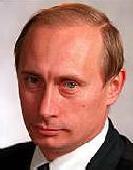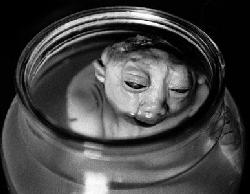|
MOSCOW, Russia, December 22, 2000 (ENS) - Russian lawmakers have voted by a large majority to allow foreign nuclear waste imports. The bill passed amends Article 50 of the 1992 Law on Environment Protection, which forbids the import of nuclear materials from foreign states with the exception of former Eastern Bloc nations with existing contracts. The new bill must go through two more readings in the lower house, before being sent to the upper house, the Federation Council. Chernobyl, Ukraine, was the scene of the world's worst nuclear accident when its fourth reactor exploded in April 1986. The affects of radiation from the accident are still felt today, with rates of thyroid cancer increasing among those in the affected areas who were children in 1986. "President Putin recently spoke of his admiration for environmentalists and their causes," said Muenchmeyer. "Today his support of this potentially lethal trade shows the depths of his hypocrisy, and his total lack of concern not just for the environment, but also the health of the Russian people." It was September 1999 when ENS correspondent Ekaterina Chistiakova first reported that Russia had begun working towards changing its laws so that it could store spent nuclear fuel and radioactive waste from other nations. The benefits of such a policy, explained Deputy Minister of Atomic Energy, Valentin Ivanov, would be to consolidate the federal budget and to improve the social and environmental situation in Russia. The Ministry for Atomic Energy (MINATOM) believes that over the next decade it could import up to 20,000 tonnes of spent nuclear fuel from countries including Japan, Switzerland, Germany, Spain, Taiwan, South Korea and China in contracts worth up to $21 billion. MINATOM argues that by accepting the rest of the world's unwanted radioactive waste it will be able to upgrade its own nuclear waste storage, clean up heavily contaminated land, and expand its nuclear reprocessing operations at the Mayak nuclear complex, 2,500 kilometers east of Moscow in the Ural mountains. "The fairy tales about nuclear cleanup by Minatom are nothing but public relations for their crude attempt to get Western money for an expansion of the Russian nuclear industry, whose disregard for safety and the environment is starkly demonstrated by the nuclear nightmare of Mayak and Krasnoyarsk," said Muenchmeyer. In September, the European Commission's head of nuclear safety, Derek Taylor, told the BBC that the risk of a serious accident at the Mayak plant is increasing. "More waste is being stored than they really have safe capacity to store," said Taylor. "I think there's always the potential for another accident. The situation at Mayak is obviously far from satisfactory." Commissioner of the United States Nuclear Regulatory Commission (NRC), Greta Joy Dicus, said in 1998, "As a result of early operational practices and some accidents at Mayak, workers at the plant and populations around the site were exposed to unusually large amounts of radiation and radioactive materials. "In many cases, the doses were comparable to those received by survivors of the Hiroshima and Nagasaki atomic bombings." An independent study into the former Soviet Union's nuclear weapon's program concluded that contamination at Krasnoyarsk is not as bad as western analysts fear. "No offsite contamination resulted from subsurface discharges at Krasnoyarsk," concluded last February's study by the International Institute for Applied Systems Analysis (IIASA) in Laxenburg, Austria. Yesterday's vote in the Duma came just weeks after 2.5 million people signed a petitiondemanding a referendum on the issue of importing nuclear waste. Two million signatures were needed, but Russian authorities refused the referendum, claiming 700,000 signatures were invalid. France and the UK are currently the only countries operating commercial reprocessing plants. Demand for new sites to accept nuclear waste is increasing as more nuclear facilities are decommissioned. Decommissioning is the final phase in the lifecycle of a nuclear installation, covering all activities from shutdown and removal of fissile material to environmental restoration of the site. Technical operations include decontamination, dismantling and waste management. About 200,000 tonnes of spent nuclear fuel has been produced by the world's nuclear reactors, a figure that increases by about 12,000 tonnes a year. Currently, almost half of this is reprocessed, 38 percent is disposed of and 15 percent is in long term storage. Within the 15 countries of the European Union, more than 110 nuclear facilities are at various stages of the decommissioning process. It is forecast that at least a further 160 facilities will need to be decommissioned over the next 20 years within the present 15 member states.
|


